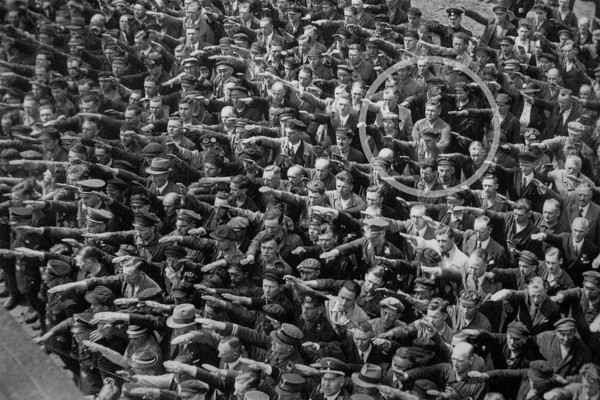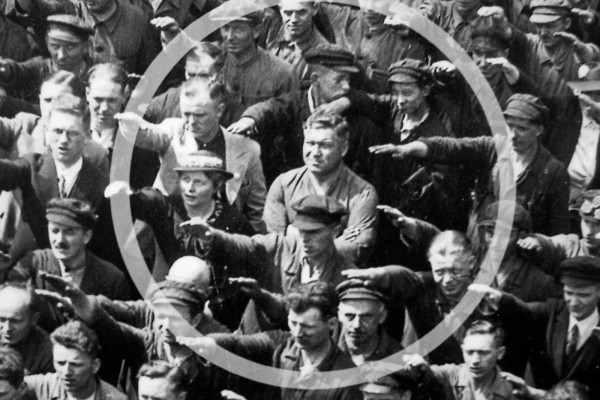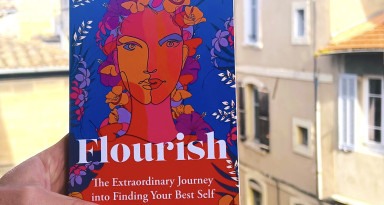There is a remarkable photograph taken in Hamburg in 1936. It shows a crowd of shipyard workers gathered for the launch of a ship. All except one are enthusiastically raising their arms in the ‘Heil Hitler’ salute. Yet there is one man with his arms firmly folded across his chest. He is defiant. He refuses to go along with the crowd, refuses to do what is expected of him. This is August Landmesser. He had been engaged to a Jewish woman, Irma Eckler, but the Nazi Nuremberg Laws of 1935 prevented him from marrying her; nonetheless they went on to have two daughters. Tragically, Irma later died in the Ravensbrück concentration camp. Landmesser was also imprisoned, charged with ‘dishonouring the race’, sent to a concentration camp and, after his release and forced conscription, died on the Eastern Front.
That photograph is a visual record of an act of great courage. Landmesser was well aware that there would be serious consequences for refusing to make the Nazi salute, and he also knew there would be consequences for continuing his relationship with Irma, in defiance of the Nuremberg Laws.
Sophia Scholl should be far better known too. As a young student studying biology and philosophy at Munich University in the early 1940s, she became a key member of the anti-Nazi resistance, part of a group called the White Rose, which wrote and distributed leaflets and was responsible for anti-Nazi graffiti. By 1943, the group was posting leaflets throughout Germany, attacking the “dictatorship of evil”, describing Nazi atrocities, and urging sabotage of the system. When, after dropping a pile of leaflets from a balcony at a town hall event, she and her brother Hans were finally arrested, they nobly resisted betraying their co-conspirators, pretending that they were responsible for the whole White Rose movement. Finally, they were executed for treason; guillotined, along with some of their colleagues. Given a chance to decry her ‘crimes’ in court, Sophie said that she had done the best she could for her nation and therefore didn’t regret the consequences that she knew would follow. She was just 21.
As I write this, there is news of the disappearance of the Iranian climber Elnaz Rekabi after competing in an international tournament in Seoul without wearing a hijab. In the face of brutal persecution, many other women have defied Iran’s strict laws that require women to wear a head covering. Some have been beaten to death simply for exposing their hair. Despite this, others continue their protest.
History is replete with similar examples of immensely courageous people who have defied powerful authorities, well-aware that grim consequences are almost inevitable, taking risks with their own lives because they think that some things are more important than personal safety. It’s possible to see both Socrates and Jesus Christ in the same light. Socrates, accused of corrupting the youth of Athens and encouraging them to worship false gods, stood trial, and refused to kowtow to his persecutors. On trial, rather than being contrite, he suggested that the city state should give him a pension because of the good that he was doing – a line of defence that was never likely to endear him to his accusers. He had opportunities to escape, but chose the death penalty, drinking hemlock rather than compromising his integrity. Following his conscience was more important than continuing to live.
Four hundred years later, Pontius Pilate had Jesus Christ crucified for his dangerous preaching and declaring himself King of the Jews. Again, he knew very well what was coming but followed his conscience.
Yet not everyone who defies social pressures to conform is praiseworthy. Not all dissent is good. Far from it. Anti-vaxxers, conspiracy theorists, some cult leaders, and many others go against the mainstream, and are sometimes very brave in confronting authorities. They take personal risks. They’re sincere in their belief that they are right. They are following their consciences. Yet they are fundamentally mistaken. Perhaps that is a kind of courage in that it involves standing up for what they take to be the truth. But it’s not a virtuous kind of courage, since they have fundamentally false and potentially dangerous beliefs. What makes it easier to describe Landmesser’s and the Scholls’ actions as courageous is that they were completely right: the Nazis were evil and had to be stopped. But does that mean we should just use the word ‘courage’ to describe actions we approve of?
Aristotle gave a useful analysis of courage. It, like all virtues, lies between two vices: one of excess, and the other of lack. Foolhardiness is when someone, far from being courageous, doesn’t value his or her life very much and takes reckless risks with it. Cowardice is when someone is so fearful that they can’t do what a brave person would do. Courage, in contrast, involves recognising the dangers, real physical risks, experiencing fear, but nevertheless having the inner strength to act. The coward is almost paralysed by fear, the foolhardy person acts without any thought about danger, but the courageous person feels the fear and does it anyway.
Formally, the conspiracy theorist who protests and is arrested, seems to be courageous under this description. But the difference is that Landmesser and the Scholls died for a cause worth dying for. Aristotle’s account implies this point too, since for him, courage isn’t just facing a fear – his discussion takes place within a wider discussion of the nature of virtue and the importance of doing the right thing. Fairly obviously, following an inner voice of conscience doesn’t guarantee that anyone will do the right thing unless they have a reliable conscience. Many serial killers have obeyed an inner voice, with terrible consequences. The difficulty is being grounded in reality, having a clear sense of right and wrong, and knowing that we aren’t deceiving ourselves. As Søren Kierkegaard pointed out in his book Fear and Trembling, at times we have to act on faith, since, like Abraham instructed to sacrifice his only son Isaac, we can’t be certain that we are doing the right thing, that things will work out for the best, that the voice we hear telling us to act is what it seems to be. Sometimes our actions are only retrospectively revealed to be the right ones. At the time of making that irreversible choice to stand up and resist, outcomes are uncertain, and yet the cost may be very high. We have to trust our hearts, but our hearts need to be well-informed.
Real courage, like the kind displayed by Landmesser, the Scholls, and Rekabi, is rare and wonderful. These people all valued their own lives, but took great risks for their beliefs for the sake of something more important than the fulfilment of individual desires. Ultimately, they all stood up for personal freedom against a repressive authoritarian state. For those of us who lack their immense courage and are temperamentally disinclined to stand up and risk everything in an act of moral defiance, they represent humanity at its best. We may not be able to emulate them, but we should celebrate them and perhaps find our own ways to resist authoritarianism.
From the 'Courage' edition, available as a single from our online store or via annual subscription.






